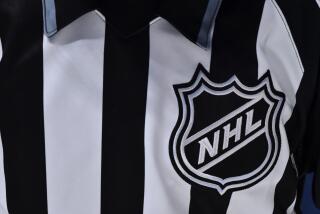NHL players may be losing more game time because of repeated concussions
- Share via
There’s good news for the hockey world: The number of concussions has decreased in recent years among National Hockey League players. But with the good comes the bad: The number of days players have lost because of recurring concussions has gone up.
Researchers examined data on 559 concussions suffered by NHL players from 1997 through 2004, with an average of 80 concussions per year, or 1.8 concussions per 1,000 player hours. With no concussion grading scale or rules for return to play, it was up to team doctors to handle the concussions based on their own judgment.
Concussion rates during regular season games went from 7.7 per 100 players during the 2000-2001 season to 4.9 per 100 players during the 2003-2004 season.
The amount of time players lost because of concussions varied greatly, from none to 342 days, with an average of six days per concussion. The most common symptoms after a concussion were headache, then dizziness, nausea, neck pain, low energy or fatigue, and blurred vision.
For every subsequent concussion, average time lost increased 2.25 times. For every additional post-concussion symptom, average time lost increased 1.89 times.
“It is becoming more apparent that athletes with acute concussion experience functional or cognitive impairment and reduced reaction times,” the authors wrote. They added that continued play immediately after a concussion could aggravate the injury or make a player more vulnerable to more injury. That, in turn, could worsen the injury and make recovery longer.
Lead author Dr. Brian Benson of the University of Calgary in Canada said in a news release that the study is noteworthy “not only as a good snapshot of the concussion problem in the league over a fairly long study period, but also as a source of practical information for team physicians about specific concussion signs and symptoms that we found to be significant predictors of potentially more serious concussions.”
The study, released today in the Canadian Medical Assn. Journal, comes on the heels of former football star Terry Bradshaw’s recent admission that the many concussions he suffered while a quarterback with the Pittsburgh Steelers are catching up with him, causing problems in his short-term memory and hand-eye coordination.
More to Read
Go beyond the scoreboard
Get the latest on L.A.'s teams in the daily Sports Report newsletter.
You may occasionally receive promotional content from the Los Angeles Times.







